Pursuing one’s dreams starts with a single step, and for many students, that step is an undergraduate education at the University of Macau (UM).
Core Elements of Undergraduate Education
Selecting an undergraduate programme is an important decision that can significantly affect an individual’s life path. A good programme must have excellent faculty and a well-designed curriculum and provide students with knowledge, comprehensive support, ample resources, and a wide range of extracurricular options. UM offers all of these essential components to undergraduate students.
At UM, over 12,000 students from nearly 50 countries and regions come together to gain knowledge, broaden their perspectives, prepare for careers and future studies, and pursue academic and personal development. Students are encouraged to integrate different disciplines and enhance their skills and knowledge on a tranquil, green campus surrounded by hills and water.
A ‘4-in-1’ Education Model
Ranked 201-250 in the 2023 Times Higher Education World University Rankings and 33rd in Asia, UM has gained an international academic reputation. It is among the top 1 per cent in Essential Sciences Indicators (ESI) rankings in ten subjects, namely Engineering, Computer Science, Materials Science, Chemistry, Pharmacology & Toxicology, Psychiatry/Psychology, Clinical Medicine, Biology & Biochemistry, Social Sciences, General, and Agricultural Sciences.
What sets UM’s undergraduate curriculum apart from others? It is the university’s unique ‘4-in-1’ education model, designed to promote the whole-person development of students. This model is made possible through the collaboration of the university’s ten residential colleges (RCs) and seven faculties and consists of discipline-specific education, general education, research and internship education, and community and peer education. The university’s experiential learning approach enables students to receive a diverse and holistic education and achieve personal development upon graduation.
Laying the Foundation for a Professional Career
No matter what career path students wish to pursue – whether it be as a teacher, film director, writer, lawyer, engineer, biomedical scientist, or entrepreneur – an undergraduate education equips them with the theoretical foundations and practical experience required to excel in their chosen field and achieve their aspirations.
UM’s seven faculties offer more than 30 undergraduate programmes in areas such as arts and humanities, business administration, education, health sciences, law, science and technology, and social sciences. Most of the degree programmes are taught in English. During their undergraduate journey, students will not only focus on their majors, but also explore other areas through courses in community and peer education, languages and skills, general education, and electives. Students can also deepen their education by taking additional minor programmes in fields such as arts and humanities, business administration, science and technology and social sciences, or the Honours College Certificate Programme.
At UM, students have the privilege of learning from an excellent faculty made up of prominent experts and members of prestigious science academies or professional associations. In the 2022/2023 academic year alone, 57 full-time academic staff members have joined the university and many of them hold degrees from prestigious institutions such as Harvard University, the University of Cambridge, Johns Hopkins University, and ETH Zurich.
The international accreditations of the university’s degree programmes enable students to easily obtain professional qualifications after they graduate. For instance, the bachelor’s degree programmes in civil engineering, computer science, electrical and computer engineering, and electromechanical engineering offered by the Faculty of Science and Technology (FST) have received full accreditation from the Hong Kong Institution of Engineers. Three of the programmes have also been recognised by the signatories to the Washington Accord. Furthermore, the Faculty of Business Administration (FBA) holds accreditations from the top three accreditation bodies for business schools, placing it among an elite group of around 100 institutions worldwide. Additionally, graduates of the FBA’s bachelor’s degree programme in accounting are eligible for paper exemptions from associations of accountants in various jurisdictions, including Australia, Hong Kong, and the United Kingdom.
As society transforms at a rapid pace, UM has introduced several undergraduate programmes in recent years in fields such as business intelligence and data analytics, education in integrated science, bioinformatics, pharmaceutical sciences and technology, applied physics and chemistry, statistics, and data science. In the upcoming 2023/2024 academic year, the university will further expand its offerings with a Bachelor of Law in Chinese Law and Global Legal Studies programme.
During her internships at two major banks in Macao, Carol Wong, a fourth-year student at UM, was able to apply her knowledge and skills acquired from the Bachelor of Business Administration (Global Business Management) programme. Wong, who is also a former president of the Honours College Student Association, put her expertise to the test in tasks such as auditing, analysing financial reports and interacting with clients. She praises the dedication of UM professors to helping students in their learning process. In particular, the professors from the Department of Management and Marketing and the Department of Finance and Business Economics have guided and supported her throughout her studies in her business research and personal development.
UM offers various dual degree programmes at the undergraduate level with renowned universities. These include a ‘2+4’ programme in biomedical sciences and clinical medicine (two years at UM and then four years at Zhejiang University) and a ‘3+2′ programme (three years at UM and two years at Queen’s University Belfast). Those interested in engineering or finance can apply for a ‘2+2’ programme offered by UM and the South China University of Technology or a ‘2.5+2.5’ programme in finance offered by UM and Fudan University, respectively.
Exploring Different Possibilities through General Education
Undergraduate students at UM are not limited to a single field of study. Instead, they are exposed to a variety of disciplines and social phenomena, honing their critical thinking and problem-solving skills and developing a sense of social responsibility. These skills are essential to becoming the informed citizens and leaders the world needs today. Undergraduate education at UM includes general education (GE), consisting of four compulsory courses and over 60 electives. These courses fall into four areas, namely global awareness, literature and humanities, science and technology, and society and behaviour, with a compulsory course in each area.
GE can often open new doors for students. Jack Hung, a fourth-year student in the Department of Electromechanical Engineering and the Chao Kuang Piu College, has aspired to become an electrical and mechanical engineer since high school. During his studies at UM, in addition to courses offered by the FST, he took eight GE courses, including a visual and performing arts course during his second year. He says that the course left a lasting impression on him and broadened his horizons.
‘Through the course of visual and performing arts, I acquired a wealth of knowledge about the basic concepts of performing arts, drama of different times and cultures, as well as the opportunity to apply theory through class rehearsals and performances,’ says Hung. He also mentions the dedication and hard work that went into the final performance of the semester, for which he and his classmates rehearsed tirelessly in the university’s Learning Commons. Hung also noted how important communication and teamwork were to the success of the performance. He later found that these skills were invaluable in his role as an intern at an engineering firm.
Accumulating Experience in Research and Internships
Research and internship education is an integral part of undergraduate education at UM. Internships allow students to put their theoretical knowledge into practice, gain valuable work experience and reflect on their interests, strengths, and weaknesses, which helps them plan their future path. In many UM undergraduate programmes, internships are a mandatory requirement for graduation. Thanks to UM’s partnerships with various companies and organisations, students can intern in different industries. They also have access to internship training in different units on campus to develop workplace skills.
A fourth-year student of the Bachelor of Education (Primary Education) programme, Sunny Ao had the opportunity to work as a trainee teacher at a school in Macao during her fourth year of study at UM. This experience allowed her to sharpen her skills in teaching and communicating with children. ‘During the internship, I received the opportunity to hone my skills in curriculum design and classroom management, and to gain a deeper understanding of the characteristics of students at different stages of development,’ says Ao. ‘In addition, the school’s professional seminars, meetings and teacher training allowed me to deepen my knowledge and skills acquired from my courses at UM.’
‘The support from the Faculty of Education was exceptional,’ adds Ao, ‘Each trainee teacher was assigned an experienced professor. They observed our lessons and gave us concrete advice to help us grow,’ she adds.
In addition, many undergraduate students take advantage of the more than 30 leading research platforms at UM, including three State Key Laboratories, a Ministry of Education Frontiers Science Center for Precision Oncology, and five joint laboratories with the Chinese Academy of Sciences. They participate in research teams led by their professors to gain valuable academic experience that will benefit their future studies and careers. These experiences include analysing data, writing research reports, and writing journal articles. Some students also take part in the annual Summer Research Programme and research projects supported by the Honours College.
Benefiting from Community Life
At UM, undergraduates enjoy ample opportunities to develop social skills and serve the community. Upon enrolment, each student is assigned to one of the ten RCs. The RC system is unique among universities in Macao and provides a platform for knowledge integration.
The RCs play a central role in the university’s community and peer education. Each has its own distinct culture and facilities, offering students the opportunity to learn and grow. Students from different academic disciplines live together in the RCs, creating a stimulating learning environment in which they can learn from each other, broaden their intellectual horizons, and communicate and work with people of different backgrounds and cultures. Such experiences would prepare them for success in a global environment upon graduation. In the RCs, a dedicated team of resident and non-resident fellows provides academic support for students by conducting non-credit-bearing tutorials in disciplinary studies, general education, and academic language skills.
To conclude, RC education at UM is highlighted by one year of RC residence experience, seven learning competencies (Responsible Citizenship, Global Competitiveness, Knowledge Integration, Teamwork and Collaboration, Service and Leadership, Cultural Engagement, and Healthy Lifestyle), five major educational approaches (RC activities, communal meals, RC courses, regular meetings with mentors, and High Table Dinners), and two types of care (pastoral care and academic support).
Outside the RCs, students can cultivate their interests and expand their networks through participation in nearly 30 sports, cultural and art teams, as well as the University of Macau Students’ Union (UMSU) and its more than 80 sub-organisations.
For non-local students like Sofia Notoe Blacky from Cape Verde, a Portuguese-speaking country in Africa, the RCs and student organisations are like a home away from home. For the past three years, besides her studies in communication and minor programme in business administration, she has been an active member of Cheong Kun Lun College and former head of the event planning department of the International Students’ Association of the UMSU.
‘In my RC, I have received the opportunity to organise and participate in a variety of cultural exchange activities to connect international students with local students. I also gave a performance of Chinese opera there. I think RC is a melting pot of culture and has allowed me to make friends and learn from people from different backgrounds.’ When she was the head of the event planning department of the association, Sofia has also organised many activities for the association and serves as a link between international students, the wider student body, and the university.
A Wealth of Learning Resources
With a campus spanning about one square kilometre, UM offers various facilities for learning, research, and living, including the largest and most well-stocked library in Macao, advanced computer equipment, sports facilities such as the UM Sports Complex and the UM Stadium, as well as various shops and recreational facilities. Students also receive career development and mental health support, as well as access to a wide range of scholarships, academic prizes, and fellowships to assist them in their academic endeavours.
In addition, UM undergraduates can study abroad and expand their horizons by participating in exchange programmes at institutions around the world. The university has established partnerships with over 150 higher education institutions in more than 30 countries and offers around 850 exchange places each year, with plans to increase this number in the future.
Enhancing Global Competitiveness
Through its undergraduate programmes, UM is dedicated to producing graduates who are creative, socially responsible, and possess a global mindset and international competitiveness. These qualities prepare them to excel in their careers and further studies not only in Macao, but also on the international stage.
Graduates of UM’s undergraduate programmes are highly sought after by international companies and prestigious universities such as the University of Oxford, the University of Cambridge, the Massachusetts Institute of Technology, Tsinghua University, Columbia University, and the University of Hong Kong. Thanks to the close ties between the university and a diverse range of enterprises, UM graduates can shine in both the local and international job market.
In recent years, many UM graduates have joined the emerging industries in the Guangdong-Hong Kong-Macao Greater Bay Area, where they use their knowledge and ideas from the university to pursue new career paths. UM graduates are also part of a vast network of over 60,000 alumni, which provides them with valuable career and networking opportunities.
Undergraduate Education: A Goal and a Journey
An undergraduate education, much like pursuing a dream, is both a goal and a journey. The worth of a UM undergraduate degree goes far beyond a certificate or a line on a CV. It marks a journey of personal development that combines discipline-specific education, general education, research and internship education, and community and peer education. At UM, students have the opportunity to learn more about themselves and the world and work with passionate professors and peers. The experiences will help them achieve their full potential so that they can become a better version of themselves.
Chinese & English / Davis Ip, Intern Ason Lei
Photo / Editorial Board
Source: My UM ISSUE 120
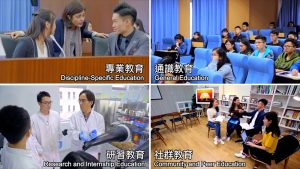
UM’s ‘4-in-1’ education model
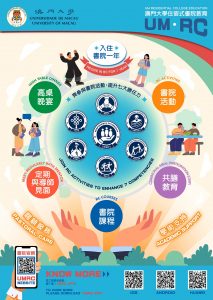
UM’s residential college education
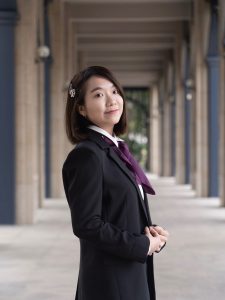
Carol Wong, a fourth-year student in the Bachelor of Business Administration (Global Business Management) programme
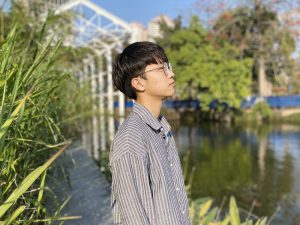
Jack Hung, a fourth-year student in the Bachelor of Science in Electromechanical Engineering programme
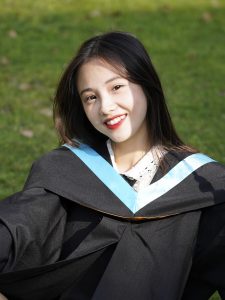
Sunny Ao, a fourth-year student in the Bachelor of Education (Primary Education) programme

Sofia Notoe Blacky, a third-year student in the Bachelor of Social Sciences in Communication programme
